- Ōura Ring vs. Fitbit Activity Trackers At-a-Glance
- Cost
- Accuracy
- Battery Life
- Features (With and Without Membership)
- Ōura Ring Pros and Cons
- Fitbit Fitness Tracker Pros and Cons
- Ōura Ring or Fitbit Fitness Tracking: Which One Is For You?
- Frequently Asked Questions
The Ōura Ring, created by the Finnish company, Ōura Health, Ltd, was first launched in 2015 via a Kickstarter campaign which raised over $650,000 (more than six times their pledge goal). Since then, Ōura has launched two other generations—the 2nd generation ring in 2018 and the latest, 3rd generation in November of 2021.
With the smart ring gaining a lot of popularity since the launch of the latest version (likely thanks to the company hiring one of Peleton's top marketers), many are comparing it to the well-known activity trackers made by Fitbit. However, although both offer health and fitness tracking, comparing the two isn't exactly comparing apples to apples.
Other than the fact that the Ōura Ring is worn on your finger, while Fitbit's fitness trackers are designed to be worn on your wrist (like a watch), the two have other significant differences that should help you decide which one to buy.
Ōura Ring vs. Fitbit Activity Trackers At-a-Glance
We only compare the Ōura Ring to Fitbit's activity trackers (not smartwatches).
| Ōura Ring | Fitbit Fitness Trackers | |
| First product release | Ōura Ring (1st Gen): 2015 | Fitbit: 2009 |
| Current products | Ōura Ring (Gen 3) |
|
| Cost* | $299 - $399 | $79.95 - $$199.95 |
| Premium Membership Fee | $5.99/month + tax | $9.99/month OR $79.99/year |
| Use as a watch? | ||
| Basic insights | ||
| Daily Readiness | (Premium only) |
|
| Stress Management | (with membership) |
(Premium only) |
| Health and Fitness Stats | ||
| Sleep Tracking | (with membership) |
(Premium only) |
| Blood glucose trends | (Premium only) |
|
| Health metrics | (with membership) |
(Premium only) |
| Wellness Report | (with membership) |
(Premium only) |
| Skin temperature tracking | (with membership) |
(Premium only) |
| Workouts | (Premium only) |
|
| Mindfulness | (with membership) |
(Premium only) |
*Based on full price on the company's website for fitness tracking devices only. Third-party sellers may offer different prices.
Cost
The price is one of the significant differences between the Ōura Ring and Fitbit fitness trackers. The Ōura Ring (Gen 3) starts at $299, compared to Fitbit, which offers trackers starting at $79.99 (at full price).
You can also buy older edition Fitbit trackers for even cheaper than that on Amazon or other sites.

- Thousands of brands, millions of products
- Free shipping on millions of items
- Free One-Day delivery with Amazon Prime, available coast to coast
However, Ōura's membership fee is cheaper than Fitbit's, so it'll eventually make up for the difference.
Accuracy
There is a lot of conflicting information about the accuracy of these health and fitness tracking devices. According to the company's studies, their heart rate data is 99.9% accurate, and their HRV data is 98.4% accurate. This is when compared to an electrocardiogram (ECG).
Fitbit's heart rate information seems pretty accurate also.
However, when it comes to calories burned and steps taken, here's when we get conflicting data. I wore both a Fitbit Inspire and an Ōura Ring for two days and noticed the information didn't match up for these two data points.
The Ōura Ring calculated that I burned more calories than the Fitbit over both days, but my step count was higher on the Fitbit.
Battery Life
When it comes to battery life, the Ōura Ring takes the top spot, lasting about a week before it needs a charge. A Fitbit fitness tracker will only last up to 5 days on a full charge—depending on how much you use it, you may need to recharge after just 3 days.
This isn't too surprising since most Fitbits have an interactive screen that offers more functions than the ring.
Features (With and Without Membership)
Both the Fitbit and Ōura Ring track different stats and offer insights, but the depth of information you get will depend on whether or not you pay for a membership.
| Without Membership | With Membership | |
| Ōura Ring |
|
|
| Fitbit Fitness Trackers |
|
|
If you're spending $300 for a fitness tracker, you'll probably want in-depth insights instead of tracking your steps only, and $5.99/month for premium Ōura Ring data is worth it.
Ōura Ring: Free Membership
Ōura recently offered a lifetime membership option for anyone who already owned a Gen 2 ring and bought the latest Gen 3 ring. They offered this to thank them for being early adopters and for being loyal.
Although this is not offered to those new to Ōura, they do offer free membership for 6 months.
Activity Tracking
If you want something that automatically tracks your activity, go with a Fitbit. Fitbit trackers can automatically detect if you're doing a particular exercise and track it without you needing to input any information. For example, if you go for a run, it'll automatically be tracked as a run in your Fitbit app.
For workouts that it can't track, Fitbits that have a screen will let you choose when you start and finish the activity.
The Ōura Ring, on the other hand, isn't great at auto-tracking workouts. It does track your steps and can auto-detect some other activities, but it misses a lot, and you also have to confirm that you did the activity within the app.
Readiness Tracking
The Fitbit and Ōura Ring will both give you a daily readiness score based on your previously logged activity and heart rate variability. You can use this score to decide whether your body is ready to work out or whether you should rest and recover.
This measurement is great for those who like doing intense workouts—knowing when you need to recover can prevent injuries.
Tracking Your Calories
Most people buy fitness trackers to lose weight—if this is the case, you'll want one that tracks your calories burned accurately. Both Fitbit devices and the Ōura Ring track your calories burned, although there is some debate on which one is more accurate.
The nice thing about the Ōura Ring is that it gives you a daily activity goal based on the data it already has about you.
Sleep Tracking
Both devices offer insights into your sleep quality, making them super helpful if you're wondering why you're feeling tired during the day. Both offer information about your key sleep stages and how long it takes you to fall asleep.
The Ōura Ring gives you an overall sleep score based on your sleep contributors, such as your timing, efficiency, readiness, latency, and total time asleep. Fitbit devices also provide similar information about sleep stages, but there is one setback—it can be pretty uncomfortable to wear when you're sleeping.
You can use this information to inform how you could potentially improve your sleep quality— maybe you need to go to bed earlier, or perhaps you're not spending enough time in deep sleep.
Design and Comfort
When it comes to design and comfort, the Ōura Ring has our pick. Although not everyone may be used to wearing a ring, Ōura has redesigned it, so it's less bulky and lightweight. On the other hand, Fitbits are designed to wear around your wrist. They can be more annoying, can catch on your clothing, and aren't exactly the most stylish accessory.
The Ōura Ring is significantly better than the Fitbit when tracking your sleep. You might have to get used to it first, but you won't even notice the ring after a few days while you're sleeping. The Fitbit, however, is much bulkier and more annoying when you're sleeping.
Monitor Your Heart Rate
Both devices monitor your heart rate throughout the day (and at night when you track sleep quality) and measure your heart rate variability (HRV). Although not an essential state for most people, tracking your HRV can warn you of possible heart conditions and other health problems, including anxiety and depression.
Your HRV tells you when your heart rate fluctuates slightly. What's generally considered a normal HRV for adults is anywhere from below 20 to 200ms.
Blood Oxygen Level
Some Fitbit fitness trackers track your blood oxygen levels (SpO2) when you're sleeping, telling you how your body is using oxygen in all stages of sleep (e.g., light sleep, deep sleep, REM). If there are significant variations, you may wish to speak to a medical professional. It can mean you have underlying causes, such as depression, sleep apnea, or high blood pressure.
Variations in your blood oxygen levels can also just be a sign of stress and signal that you need to slow down and focus on your wellbeing.
Ōura Ring Pros and Cons
We love the Ōura Ring for several reasons, but it's not for everyone. So before buying one, here are some things to consider.
Pros
- Discreet and easy to wear
- Tracks several health factors
- Give insights and recommendations on improving health and wellbeing
- Tracks skin temperature (great for monitoring sickness and tracking womens' menstrual cycles)
- Battery lasts for about a week
- Easy and fast to charge using provided charging dock
- Comes in four different colors
- Waterproof up to 100m
- Durable and lightweight (made from titanium)
- Sleep tracking and analysis of sleep stages (automatic sleep monitoring)
Cons
- Sizing is not adjustable (it does come with a free sizing kit)
- Not available in half sizes
- Can't use as a watch
- Need to open the app to see the data
- Expensive
- Not yet compatible with a lot of fitness apps (although it is compatible with Google Fit and Apple Health app)
- Doesn't auto-record workouts
Fitbit Fitness Tracker Pros and Cons
If you're considering getting a Fitbit, it does have its benefits compared to the Ōura Ring.
Pros
- More affordable options
- Can style the band how you want
- Can use it as a watch
- In-depth health tracking
- You can check some stats without using your phone (for some models)
- Compatible with most fitness apps
- Reminds you to move
- More sleep tracking data provided (uses Estimated Oxygen Variability)
- Automatic sleep monitoring
- Able to automatically record workouts
- Can record workouts from the watch directly (no need to open the app)
Cons
- Can get caught on clothes, bags, etc.
- Not that accurate
- Not a ton of features unless you buy a Premium membership
- Battery lasts up to 5 days only
- Not as waterproof as the Ōura Ring
- Most are water-resistant to 50m, while the Fitbit Ace is only showerproof
Ōura Ring or Fitbit Fitness Tracking: Which One Is For You?
There isn't one answer for everyone—when choosing between the Ōura Ring and a Fitbit device, you will have to look at all of this information and determine what suits your lifestyle and needs.
Cost
The fitness tracker you pick will depend on many factors, with the very first one to consider being the cost. The Ōura Ring is more of an investment—it's not something you want to buy if you're unsure if you'll find it useful or not.
Fitbit has much more affordable fitness trackers you can use to start with if you're not entirely convinced you'll find a fitness tracker useful. Additionally, the Fitbit should be sufficient if you have a pretty healthy lifestyle, aren't concerned about your sleep stages, and want to track basic data.
Needs
The other thing you'll want to consider is what you actually want to track. For example, if you wish to track your heart rate, the Fitbit is more affordable, but the Ōura Ring may be more accurate. On the other hand, if you want a more in-depth analysis of your heart rate variability or resting heart rate, the Ōura app may provide more insights you're looking for.
The Ōura Ring focuses a lot more on overall health and wellbeing but doesn't do as great of a job for fitness tracking and monitoring workouts as Fitbit devices do.
Style and Comfort
Finally, you'll need to consider which one you're more willing to wear. If comfort and style are important to you, it's worth spending a few hundred dollars on the Ōura Ring. On the other hand, if you're used to wearing a watch and don't mind the look of Fitbit devices, you can save yourself some money by going that route.
This is something that's especially important to consider if you want sleep tracking, as the Fitbit can be pretty uncomfortable to wear to bed.

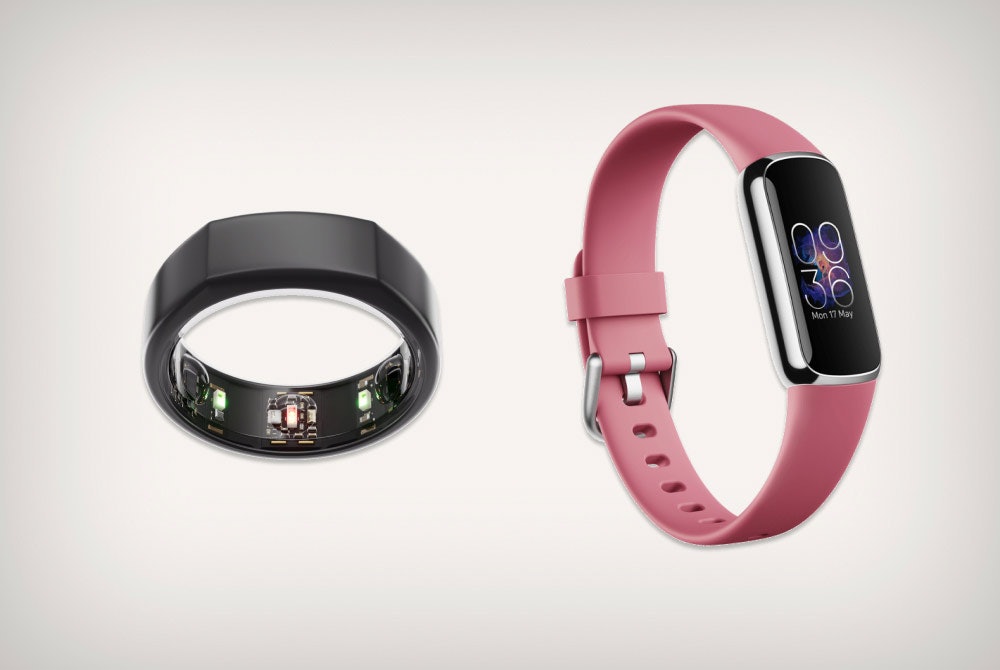
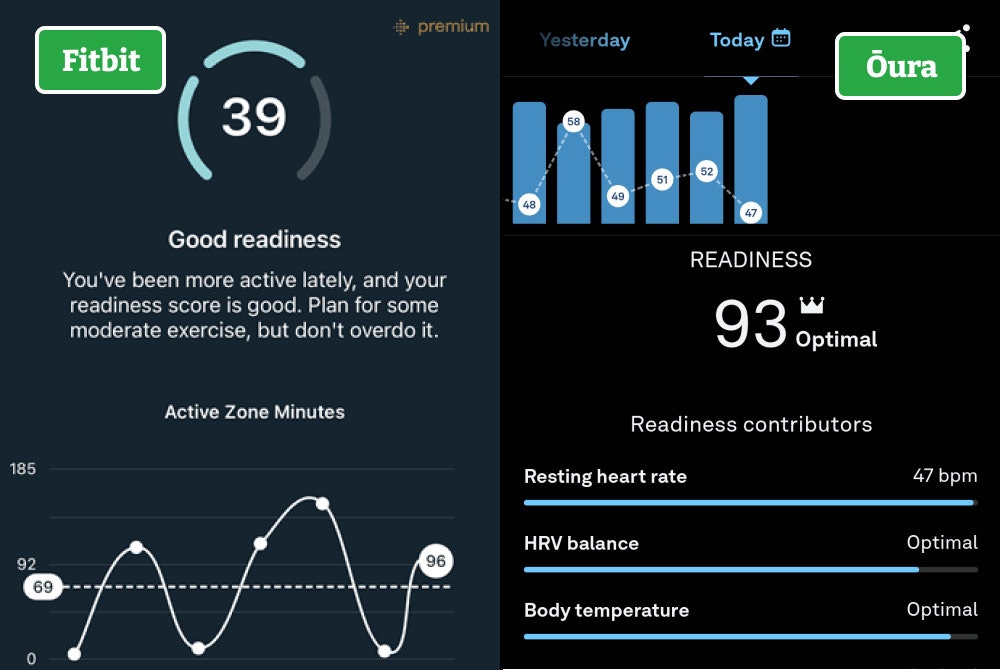
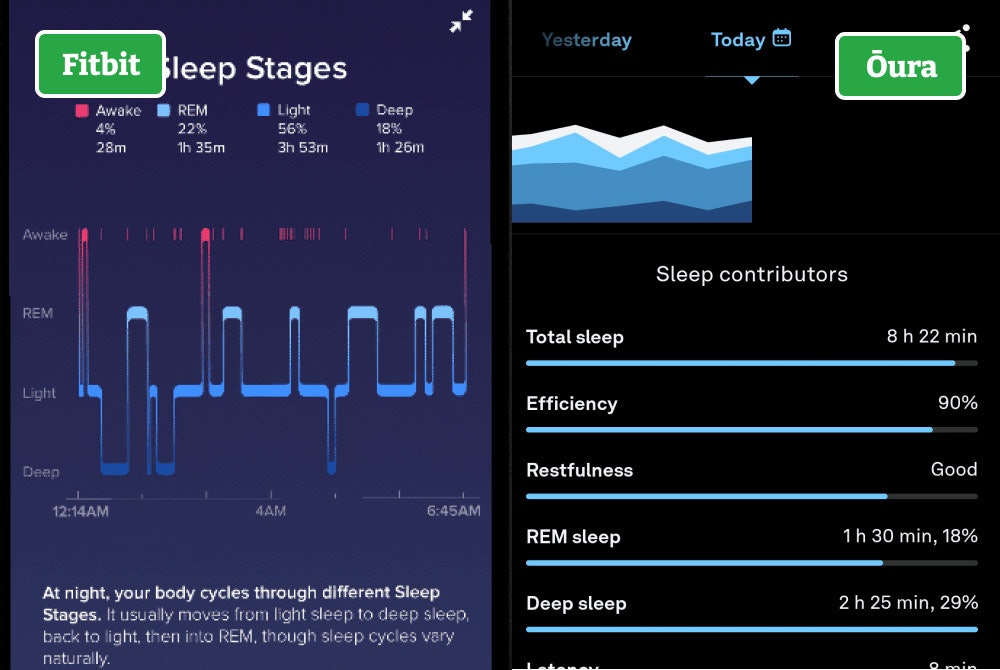
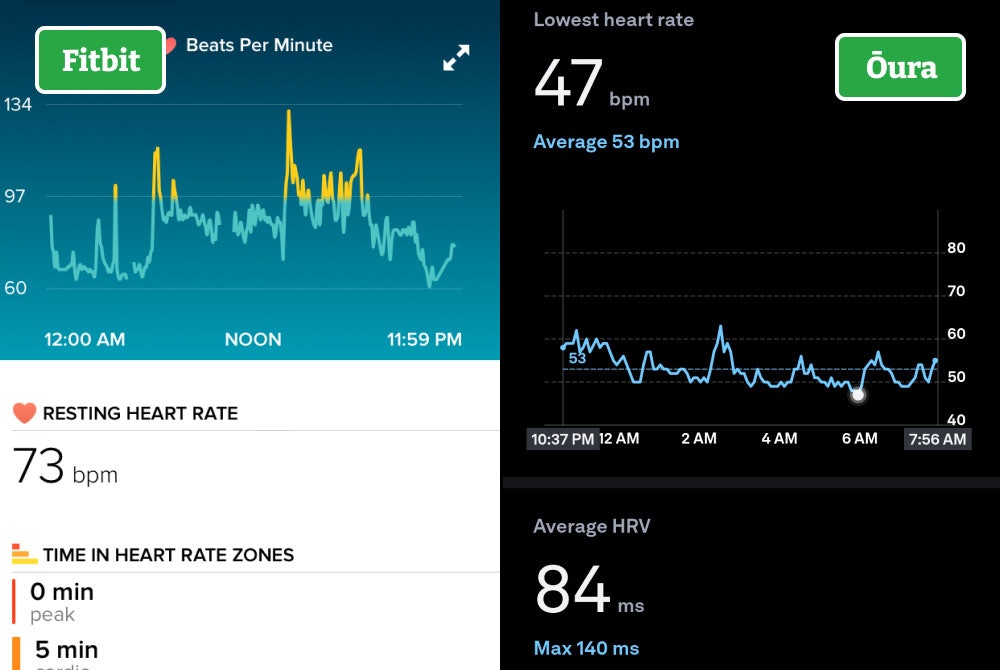








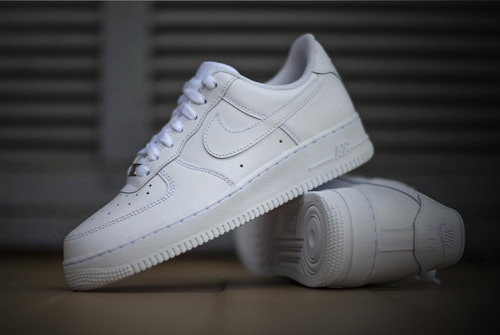
Comments